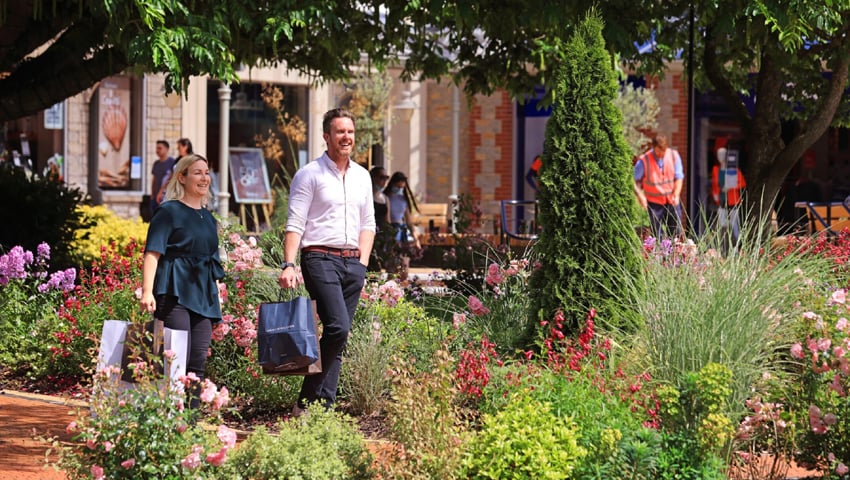New research conducted by Landsec suggests improving nature and biodiversity needs to be at the heart of UK city planning if they are to remain desirable places for people to live and work.
Landsec’s research reveals over half (55%) of people living and working in UK cities plan to leave in the future, a third (33%) in the next ten years, with more access to nature and green space cited as the top reason.
The polling of over 1,200 people across some of the UK’s major cities, including London, Birmingham, Manchester, Leeds, Glasgow, and Cardiff, revealed other top reasons for wanting to leave cities including: access to more nature and green space (34%), access to fresher air (33%) and to be closer to family and friends (24%).
Landsec Head of Sustainability, Jennie Colville says, “Nature is not a luxury but a necessity for equitable, resilient and thriving cities. It plays a vital role in keeping our cities habitable, from the food that we eat, to the air that we breathe, and can be one of the best lines of defence against climate change. The quality and amount of nature in urban places has been neglected in recent years because of population growth, industrialisation and the development needed to meet modern society’s needs.
“To build the cities we need for the future, we must change our approach to urbanisation in a way that enables people and nature to co-exist, while creating jobs and fuelling economic growth. If cities don’t embrace this change, they risk losing out on valuable talent, growth, and vitality, while remaining vulnerable to the intensifying impacts of climate change. Through our nature strategy, we’re taking a holistic approach to the way we design, develop, and manage our places to find the right solutions, ones that benefit the environment and communities, and reflect the full value of nature.”
Expectations people have of what cities should provide for them has risen since the Covid-19 pandemic, which saw cities hit by lockdowns and economic downturns that have caused many to rethink their quality of life. Over half (53%) of respondents now expect more to be done on issues including air quality, affordable housing, and greater access to nature near their homes.
The research iterates the importance of putting nature at the heart of urban developments, to ensure cities remain desirable places for people to live and work, and can remain engines of the UK economy. It outlines the high value people living and working cities put on nature, with a resounding 94% placing at least some importance on nature access. Almost four in ten respondents (39%) named inclusion of green space and more trees, plants and wildlife as the biggest priority for developers in new building developments – only behind transport links (41%).
There is a growing risk that if cities do not match the importance people place on nature, many will begin to look elsewhere. With over four-fifths (84%) believing their city should be doing more to prepare for climate change, and nine in ten (87%) recognising the importance of new developments in their city prioritising nature, there is clear work to be done to align with people’s priorities.
It comes as Landsec launches a new nature strategy that aims to deliver a range of nature-led benefits across its urban spaces, led by three core principles which will apply across its current and future assets:
- Improving biodiversity – New habitats for wildlife are being created to ensure nature and biodiversity flourishes across Landsec assets. Improving biodiversity across Landsec assets and developments will be measured by Biodiversity Net Gain (BNG), which quantifies the extent to which habitats have been created or enhanced.
- Promoting health, wellbeing, and community engagement – Creating and maintaining high-quality green spaces that encourage social interactions immersed in nature. Landsec will use the Environmental Benefits from Nature tool, created by Natural England and the University of Oxford, to evaluate the health, wellbeing, and community benefits it has created through improving nature across its developments.
- Creating nature-based solutions – Incorporating nature-based solutions into the urban spaces it develops and operates to help meet net zero ambitions and build resilience to a changing climate. Landsec will use the Urban Greening Factor measurement to analyse the quality of green space on providing ecosystem services such as permeability, cooling, and air purification.
The strategy’s three core principles align with what people living and working in cities understand about the positive impact nature can provide to society and their quality of life, such as benefits to physical health (85% agree) and mental health (87%), as well as mitigating the impacts of climate change (80%).
The strategy will go beyond current government guidelines, which requires developers to provide 10% BNG on all habitats within the redline boundary of their development, whether or not they are impacted. For existing assets, Landsec has committed an additional 10% increase to its existing BNG targets, while for future developments Landsec will aim to make a 20% BNG on sites with existing ‘greening’ and ensure the development of 2 biodiversity units per hectare for sites with ‘no greening’.
